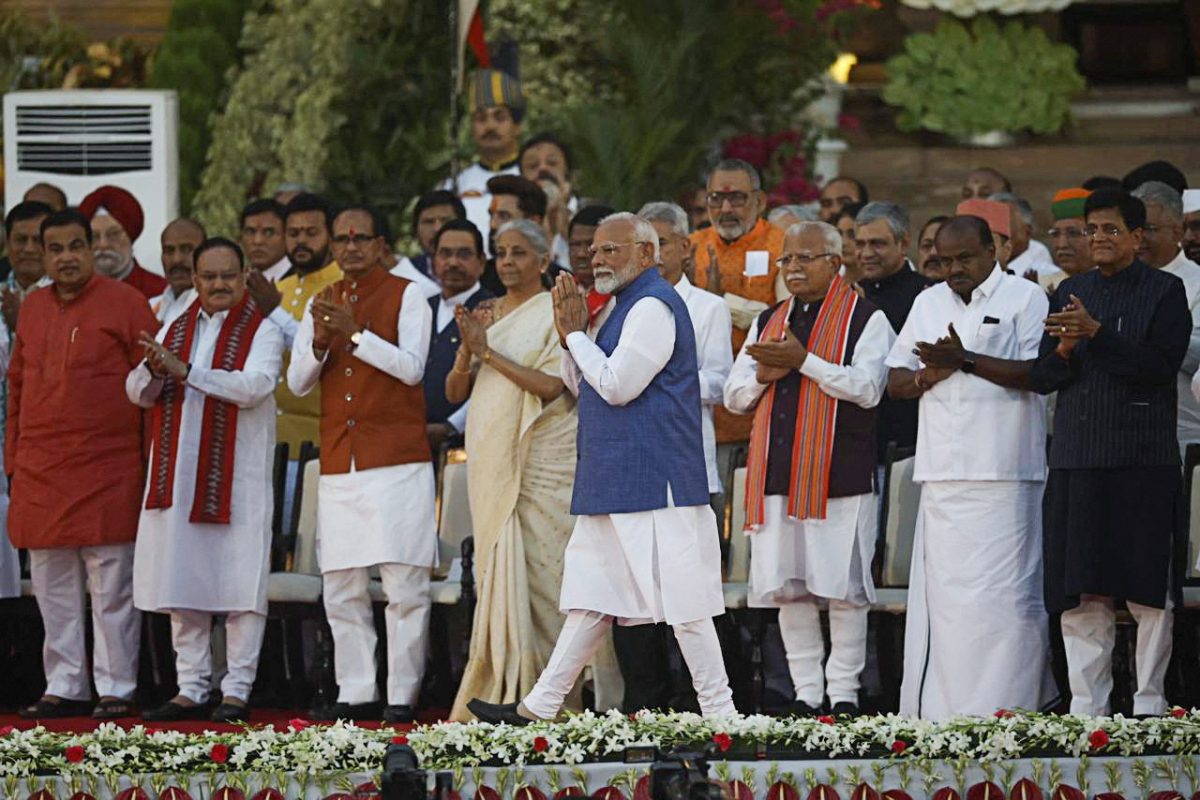NEW DELHI, (Reuters) – Narendra Modi was sworn in as India’s prime minister yesterday for a third term, after a shock election setback that will test his ability to ensure policy certainty in a coalition government in the world’s most populous nation.
President Droupadi Murmu administered the oath of office to Modi at a ceremony at the Rashtrapati Bhavan, the president’s palace in New Delhi, attended by thousands of dignitaries, including the leaders of seven regional countries, Bollywood stars and industrialists.
“Honoured to serve Bharat,” Modi posted on X, minutes before he was sworn in, referring to India’s name in Indian languages.
Supporters cheered, clapped and chanted “Modi, Modi” as the 73-year old leader, dressed in a white kurta tunic and blue half jacket, was called to take his oath.
Modi was followed by senior ministers in the previous government: Rajnath Singh, Amit Shah, Nitin Gadkari, Nirmala Sitharaman, Subrahmanyam Jaishankar, and Piyush Goyal, among others. Their portfolios were expected to be announced after the swearing-in.
Midway through the inauguration, news came that at least nine people were killed and 33 injured when a bus carrying Hindu pilgrims plunged into a gorge after a suspected militant attack in the federal territory of Jammu and Kashmir, drawing criticism of the security situation from the opposition Congress party.
Modi, who started as a publicist of the Hindu nationalist Rashtriya Swayamsevak Sangh, the ideological parent of his Bharatiya Janata Party, is only the second person after independence leader Jawaharlal Nehru to serve a third straight term as prime minister.
Modi secured the third term in after multi-stage election that concluded on June 1 with the support of 14 regional parties in his BJP-led National Democratic Alliance. In the previous two terms his party had won an outright majority.
The outcome is seen as a big setback to the popular leader as surveys and exit polls had predicted BJP would secure even more seats than in 2019.
COALITION CHALLENGES
Modi delivered world beating growth and lifted India’s global standing, but appeared to have missed a step at home as a lack of enough jobs, high prices, low incomes and religious faultlines pushed voters to rein him in.
When Modi was the chief minister of the western state of Gujarat from 2001 to 2014 the BJP enjoyed strong majorities, allowing him to govern decisively.
Modi’s new term as prime minister, therefore, is likely to be fraught with challenges in building consensus on contentious political and policy issues in the face of different interests of regional parties and a stronger opposition, analysts say.
Some analysts worry that the fiscal balance in the world’s fastest growing economy could also come under pressure due to demands for higher development funds for states ruled by the NDA’s regional partners and a possible push by the BJP to spend more on welfare to woo back lost voters.
While the broad focus on building infrastructure, manufacturing and technology could continue, “contentious reforms could be delayed”, said Samiran Chakraborty, Chief Economist, India, at Citi Research.
“The BJP’s major coalition partners are politically unpredictable, sometimes working with the BJP and sometimes working against them,” added Rick Rossow, the Chair in U.S.-India Policy Studies at the Center for Strategic and International Studies in Washington.
“The larger parties that will be a part of his coalition are mostly agnostic on national-level issues and should not be applying a brake on economic reforms or security ties with the United States, Japan, and other key partners,” he said.
Modi, whose election campaign was marked by religious rhetoric and criticism of the opposition for allegedly favouring India’s 200 million minority Muslims, has adopted a more conciliatory tone since the result.
“We have won the majority … but to run the country it is unanimity that is crucial … we will strive for unanimity,” he said on Friday after the NDA formally named him coalition head.
